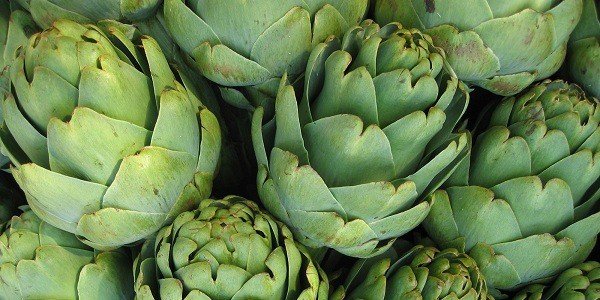Artichoke

The artichoke is a herbaceous plant of the Asteraceae family with large inflorescences, the fleshy lower parts of which are used for food. Its homeland is the Mediterranean.
It is currently very popular in America, especially in California, where it was cultivated by the French and Spanish settlers. In its raw form, the artichoke tastes like an unripe walnut.
Choosing this vegetable, pay attention to its uniform green color, not too soft or too dry.
Calorie content
Both the Spanish and French artichoke is considered a low-calorie diet food and 100 grams of it contains a total of 47 kilocalories.
The calorie content of this vegetable in boiled form without added salt is 53 kilocalories. Therefore, its consumption is considered beneficial for health even for overweight people.
The nutritional value of one medium-sized artichoke /about 128 grams/ is:
• Proteins – 4 grams;
• Fats – 0.2 grams;
• Carbohydrates – 13 grams;
• Vegetable fibers – 7 grams;
• Sugars – 1 gram;
• Sodium – 120 mg.;
Beneficial properties
In addition to a pleasant taste, the artichoke has a rich balanced set of nutrients.
The inflorescence, that is, the edible part of the plant, contains carbohydrates up to 15%, proteins up to 3%, fat about 0.1%.
The artichoke is a very good source of vitamin C, B1, B2, B3 and P, and of carotene and inulin.
It also contains organic acids – caffeic, quinic, chlorogenic, glycolic and glycerine.
The shell of the inflorescence contains essential oils that give the pleasant taste of the artichoke.
In the edible part of the plant, through laboratory analysis, scientists have established the presence of many valuable substances: biologically active glycoside – cynarin and the polysaccharide – inulin. Artichoke is used as food in fresh, canned or cooked form.
It is also considered a dietary food, which is well absorbed and is recommended as a substitute for starch in diabetes mellitus.
Consumption of just one artichoke per day provides 28% of the daily recommended dose of fiber, which is important for maintaining intestinal peristalsis and normal frequency of bowel movements.
Plant fiber also helps lower blood sugar levels, protect against the development of inflammatory processes and lower low-density lipoprotein cholesterol levels.
Ciarin, which is contained in the artichoke, stimulates the formation of bile in the liver, which is also the reason for lowering cholesterol.
Another useful property is that by consuming 1 medium-sized artichoke, a person can obtain 25% of the daily required amount of vitamin C, also known as ascorbic acid.
This compound also has antioxidant properties, protecting cells from the damaging effects of free radicals, which are formed when nutrients are converted into energy.
By consuming 1 artichoke, a person can also provide about 24% of the daily dose of vitamin K /another antioxidant/, as well as 22% of the folic acid.
The edible part of the herbaceous plant is also a very good source of magnesium, manganese, copper, potassium and phosphorus.
Scientific research conducted with artichoke
In a 2011 study, an extract from the edible part of the herb was found to have a negative effect on malignant cells in breast carcinoma.
p>
As the authors of the study evaluate the effect of the artichoke as suppressive in relation to the proliferation of cancer cells and the invasion of the tumor mass.



